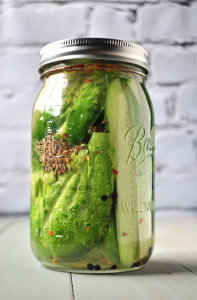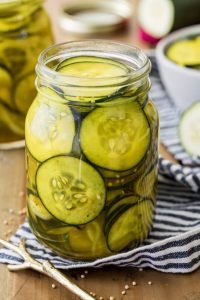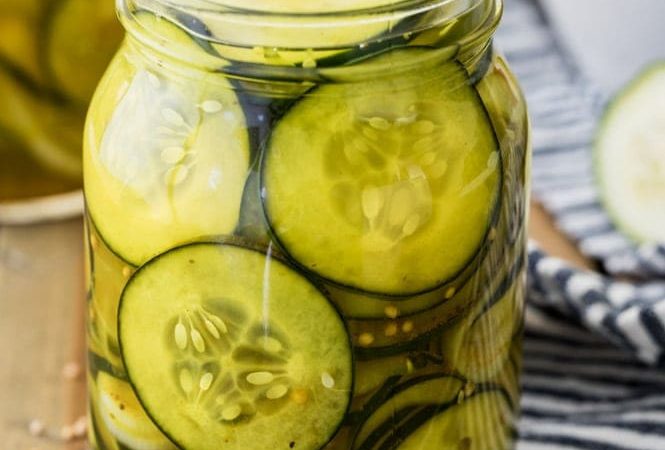Introduction: If so, you’re in for a treat! Join us on a journey into the world of homemade refrigerator pickles with a seasoned expert – the Master Food Preserver. With years of experience, our guide is here to help you elevate your pickle game and unveil the art of crafting crisp delights that will leave
Introduction:
If so, you’re in for a treat! Join us on a journey into the world of homemade refrigerator pickles with a seasoned expert – the Master Food Preserver. With years of experience, our guide is here to help you elevate your pickle game and unveil the art of crafting crisp delights that will leave your taste buds dancing. Refrigerator pickles, also known as quick pickles, offer a delightful way to preserve your favorite vegetables. Unlike traditional canning, these pickles require no special equipment or complicated processes. They’re the perfect choice for those who crave homemade goodness without the fuss. When it comes to pickles, you might be used to store-bought jars, but homemade refrigerator pickles are a game-changer. They offer a freshness and crispness that can’t be beaten. With the right ingredients and a little know-how, you can create these delightful treats in your own kitchen.

image by https://th.bing.com
Ingredients for Success
The foundation of any great pickle lies in its ingredients. The Master Food Preserver shares the secret components that contribute to the distinctive flavor and crunchiness of refrigerator pickles. From vinegar to spices,
Cucumbers: The star of the show, cucumbers are best when they’re firm and fresh. You can grow your own or source them from a local farmers’ market. Remember, the quality of your cucumbers will significantly affect the outcome of your pickles.
Vinegar: The choice of vinegar is crucial. While white vinegar is the most common option, you can experiment with apple cider vinegar, white wine vinegar, or even rice vinegar to create unique flavor profiles.
Salt: High-quality, non-iodized salt is recommended for the brine. Kosher salt or pickling salt dissolves easily and won’t make your pickles cloudy.
Spices and Herbs: Get creative with spices and herbs. Dill, garlic, mustard seeds, and red pepper flakes are popular choices. Customize your pickles to match your taste preferences.
Perfect Brine Formula
The brine is the heart of any pickle. Here, we break down the science of brine creation. Our expert reveals the ideal salt-to-water ratio, ensuring that your pickles achieve the perfect balance of saltiness and tanginess.
For a standard brine, you’ll want to use 1 part salt to 4 parts waters. Dissolve the salt in water to create your brine solution. You can adjust the saltiness by adding more or less salt but remember that this is a critical factor in the pickle’s taste, so be cautious with your measurements.
The brine should also include vinegar. A common ratio is 1 part vinegar to 3 parts waters, but you can adjust this to taste. The vinegar adds the necessary acidity that not only preserves the pickles but also gives them their signature tang.

image by https://sugarspunrun.com
Selecting the Right Cucumbers
Not all cucumbers are created equal. Discover the varieties that are best suited for refrigerator pickles. Our guide explains the importance of selecting the right cucumbers for superior texture and flavor.
When choosing cucumbers for your refrigerator pickles, look for the following characteristics:
- Size: Go for small to medium-sized cucumbers. They tend to be crisper than larger ones.
- Skin: opt for cucumbers with thin, unwaxed skins. If the cucumbers are waxed, make sure to scrub them well to remove the wax.
- Seeds: Check the seed cavity. Smaller cucumbers usually have smaller and fewer seeds, contributing to better texture.
- Freshness: Pick fresh cucumbers. The fresher they are, the crisper your pickles will be.
Customizing Your Pickles
One of the beauties of homemade refrigerator pickles is the freedom to customize. Our expert provides insight into experimenting with various spices, herbs, and flavor profiles, allowing you to create pickles that cater to your unique palate.
- Dill Pickles: Add fresh dill, garlic, and mustard seeds for a classic dill pickle flavor.
- Spicy Pickles: Throw in some red pepper flakes or whole chili peppers for an extra kick.
- Sweet Pickles: Experiment with sugar and warm spices like cinnamon and cloves to create sweet and tangy pickles.
- Bread and Butter Pickles: Try a combination of sugar, mustard seeds, and onion for the classic bread and butter pickle taste.
Art of Presentation
Your refrigerator pickles not only taste divine but can also look visually appealing. Learn how to present your homemade pickles in an enticing and artful manner, making them perfect for gifting or elevating your culinary creations. Presentation matters! If you’re planning to share your homemade pickles with friends and family or you simply want to elevate your culinary creations, consider the following tips:
- Jar Selection: Use clean, glass jars with tight-fitting lids. Mason jars or vintage glass containers are excellent choices.
- Layering: Arrange your pickles and spices in an appealing and organized manner within the jar.
- Labeling: Create custom labels with the date and type of pickle. This adds a personal touch and makes for a great gift.
KeyPoint:
| Pickling Method | Processing Time | Equipment Required | Shelf Life |
|---|---|---|---|
| Refrigerator Pickles | Hours | Minimal | Months |
| Canned Pickles | Days | Special Canning Equipment | Years |
| Fermented Pickles | Weeks | Fermentation Crocks | Months |
Conclusion:
In the world of homemade culinary delights, few things are as satisfying as the crisp, tangy goodness of refrigerator pickles. We embarked on a journey guided by the Master Food Preserver, unraveling the secrets behind these delectable treats. From the magic of refrigerator pickles to the art of presentation, we’ve covered all you need to know to become a refrigerator pickle aficionado. Refrigerator pickles offer a unique advantage: they require no complex equipment or lengthy processing times. With the right ingredients, a well-balanced brine, and a dash of creativity, you can craft pickles that rival the finest store-bought varieties.

















Leave a Comment
Your email address will not be published. Required fields are marked with *